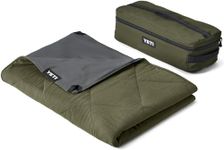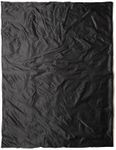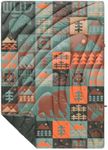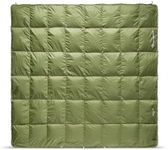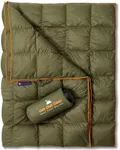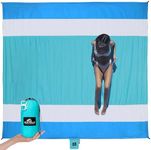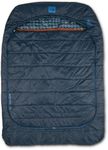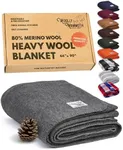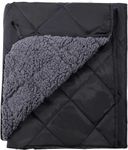Buying Guide for the Best Camping Blankets
Choosing the right camping blanket can significantly enhance your outdoor experience by providing warmth, comfort, and convenience. When selecting a camping blanket, consider the environment you'll be camping in, the season, and your personal comfort preferences. A good camping blanket should be lightweight for easy transport, durable to withstand outdoor conditions, and provide adequate insulation to keep you warm during chilly nights. Understanding the key specifications will help you make an informed decision that best suits your camping needs.MaterialThe material of a camping blanket is crucial as it determines the blanket's warmth, weight, and durability. Common materials include fleece, wool, and synthetic fibers. Fleece is lightweight and quick-drying, making it ideal for mild weather. Wool is heavier but offers excellent insulation and moisture-wicking properties, suitable for colder climates. Synthetic materials like polyester are versatile, often water-resistant, and provide a good balance of warmth and weight. Choose a material based on the climate you'll be camping in and your preference for weight and warmth.
InsulationInsulation refers to the blanket's ability to retain heat and keep you warm. It is especially important if you plan to camp in colder environments. Blankets with down insulation are lightweight and compressible, offering excellent warmth but can be less effective when wet. Synthetic insulation, on the other hand, is bulkier but retains heat even when damp. Consider your camping conditions and whether you prioritize packability or performance in wet conditions when choosing the type of insulation.
SizeThe size of a camping blanket affects both its coverage and portability. Larger blankets provide more coverage and can be shared, but they may be bulkier and heavier to carry. Smaller blankets are more compact and easier to pack, making them suitable for solo campers or those with limited space. Consider how many people will use the blanket and how much space you have for packing when deciding on the size.
WeightWeight is an important factor, especially if you plan to carry the blanket over long distances. Lightweight blankets are easier to transport and are ideal for backpacking trips. Heavier blankets may offer more warmth and comfort but can be cumbersome to carry. Assess your camping style and how much weight you are willing to carry when selecting a blanket.
Water ResistanceWater resistance is a valuable feature for camping blankets, as it helps protect against moisture from dew, rain, or damp ground. Some blankets have a water-resistant coating or are made from water-repellent materials. This feature is particularly important if you expect wet conditions or plan to use the blanket on the ground. Consider the likelihood of encountering moisture during your camping trips when evaluating the need for water resistance.
PackabilityPackability refers to how easily a blanket can be compressed and stored in your backpack or camping gear. A highly packable blanket is ideal for those with limited space or who need to carry their gear over long distances. Look for blankets that come with a stuff sack or compression straps to make packing easier. Consider how much space you have available and how important compact storage is for your camping trips.
